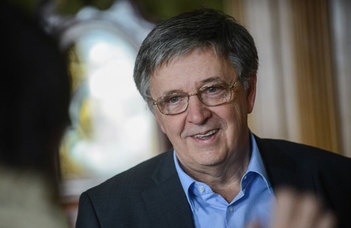Abel Prize awarded to László Lovász

They received the prize for their foundational contributions to theoretical computer science and discrete mathematics, and their leading role in shaping them into central fields of modern mathematics.
The theory of ‘computational complexity’ – which concerns itself with the speed and efficiency of algorithms – first emerged in the 1970s and is now an established field of both mathematics and theoretical computer science. Computational complexity is now a very important field, providing the theoretical basis for internet security. Also in the 1970s, a new generation of mathematicians realised that discrete mathematics had a new area of application in computer science. Today algorithms and internet security applications are an integral part of everyday life for all of us.
“Lovász and Wigderson have been leading forces in this development over the last few decades. Their work interlaces in many ways, and, in particular,
they have both made fundamental contributions to understanding randomness in computation and in exploring the boundaries of efficient computation,”
says Hans Munthe-Kaas, chair of the Abel Committee. He continues: “Thanks to the ground-breaking work of these two, discrete mathematics and the relatively young field of theoretical computer science are now firmly established as central areas of modern mathematics.”
In the 1970s, graph theory became one of the first areas of pure mathematics able to illuminate the new field of computational complexity. One of the major impacts of Lovász’s work has been to establish ways in which discrete mathematics can address fundamental theoretical questions in computer science. He has said that he feels very lucky to have experienced one of those periods when mathematics was developing in complete alignment with an area of application.
In addition to his work on the foundational underpinning of computer science, Lovász has also devised powerful algorithms with wide-ranging applications. One of these, the LLL algorithm, named after Lovász and the brothers Arjen and Hendrik Lenstra, represented a conceptual breakthrough in the understanding of lattices, and has had remarkable applications in areas including number theory, cryptography and mobile computing. Currently, the only known encryption systems that can withstand an attack by a quantum computer are based on the LLL algorithm.
Recent research of the mathematician at ELTE focuses on the mathematical foundations of large networks. In 2018, the Alfréd Rényi Institute of Mathematics, the János Bolyai Mathematical Society and Eötvös Loránd University organized a scientific conference in his honor, where the international community of mathematicians discussed topics related to his research during the five-day event.
According to him, “research is an urge, if someone truly is a mathematician, since it requires continuous thinking about problems waiting to be solved.” In an interview, he compared mathematical problem solving to the key move in chess: “Suddenly everything becomes clear and intelligible. These are the most attractive moments in a mathematician’s life. And these moments attracted me as a child as well” The world renowned scientist graduated from ELTE and he said the following about the study years here: “it was a decisive stage of my life, all thanks to my wonderful professors”
In an interview,
he named diligence and respect for science and the work of others as the most important values.
Besides never stopping research, teaching has a crucial role in his life: “I like teaching because teaching provides a framework for life. It also gives joy, especially if it can give talented students something that makes their eyes sparkle with excitement. I am very happy to teach the best, the researchers of the future.”

